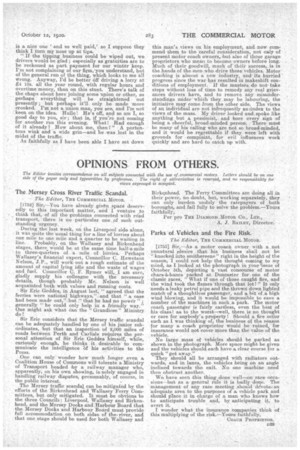OPINIONS FROM OTHERS.
Page 41

If you've noticed an error in this article please click here to report it so we can fix it.
The Editor invites ecrrresnondence on all subjects connected with the use of_commercial motors. Letters should be on one side of the paper only and typewritte,i by preference. The right of abbreviation is reserved, ancl no responsibility for views expresspd-is accepted,
The. Mersey Cross River Traffic Scandal.
The Editor, THE COMMERCIAL MOToR,
[1752j Sire—You have already giv.tri space deservedly to this important matter, and I venture to think that, of all the problems connected with road transport, there is no particular one_of such outstanding urgency.
During the last week, on the Liverpool side alone, it was quite the usual thing for a line of lorries about one mile to one mile and a quarter to be waiting in line. Probably, on the Wallasey and Birkenhead stages, there would be at the same time half-a-mile to three-qudrters af a mile of lorries, Perhaps Wallasey's financial expert, Councillor C. Hewetson Nelson, J.P., will work out a rough estimate of the amount of capital lying idle and the waste of wages and fuel. Councillor C. F. Rymer will, I am sure, gladly supply his colleague with the necessary details, though probably Mr. Nelson is well acquainted both with values and running costs, Sir Eric Geddes, in August last, " agreed that the ferries were national highways," and that "a case had been made out," but "that he had no power " ; generally "he could only help in a friendly way." One might ask what Can the "Grandiose" Ministry do?
Sir Erie considers that the Mersey traffic scandal can be adequately handled by one of his junior sub ordinates, but that an inspection of 2,000 miles of roads between Perth and Carlisle requires the personal attention of Sir Eric Geddes himself, while, curiously enough, he thinks it desirable to communicate the intelligence of his activities to the Press.
One can only wonder how much longer even a Coalition House of Commons will tolerate a Ministry of Transport headed by a railway manager who, apparently, on his own showing, is solely engaged in handling railway disputes, presumably, of course, in the public interest.
The Mersey traffic scandal can be mitigated by the efforts of the Birkenhead and Wallasey Ferry Committees, but only mitigated. It must be obvious to the three Councils: Liverpool, Wallasey and Birkenhead, and the Mersey Docks and Harbour Board that the Mersey Docks and Harbour Board must provide full accommodation on both sidee of the. river, and that one stage shOuld be used for both Wallasey and
Birkenhead. The Ferry Committees are doing all in their power, no doubt, but, working separately, they can only burden unduly the ra,topayers of both boroughs, and fail fully to solve the problem.—Yours faithfully, Per pro THE DIAMOND MOTOR CO., LTD., A. J. BAILEY, Director.
Parks of Vehicles and the Fire Risk.
The Editor. THE COMMERCIAL MOTOR.
[1753] Sir,—As a motor coach owner with a not unnatural idesire that his business shall net be " knocked into smithereens" right in the height of the season, I could not help the thought coming to my mind, as I looked at the photograph in your *issue of October 5th, denieting a vast concourse of motor chars-à-banes parked at Doncaster for one of the classic races, "What if one of those caught fire, and the wind took the flarnes'through that lot!" It only needs a leaky petrol pipe and the thrown down lighted match .c)f a thoughtless passenger, and a bit of,a high wind blowing, and it would be impossible to save a number of the machines in such.a park. The motor coach passenger is fairly .careless, even the best of his-class! as to the worst—well, there is no thought or care for anybody's property! Should a fire oceur such as I was thinking of the business of the season for many a, coach proprietor would be ruined, for insurance would net cover more than the value of the vehicle.
No large mass of -.Vehicles should be parked as shown in the photograph. More space might be given and the vehicles should each have a clear course for a quick "get away."
They should all be arranged with radiators outwards, and in lanes, the vehicles being on an angle inclined towards the exit. No one machine need then obstruct another.
We have seen this thing done well—on rare oceae eions—but as a general rule it is badly done. The management of any race meeting should cldvote, an adequate area to the purposes of a vehicle park and should place it in charge of a, man who knows how to anticipate trouble and, by anticipating it, to avert it.
I wonder what the insurance companies think of this multiplying of the risle.—Youre faithfully,
COACH PROPRIETOR. D29




























































